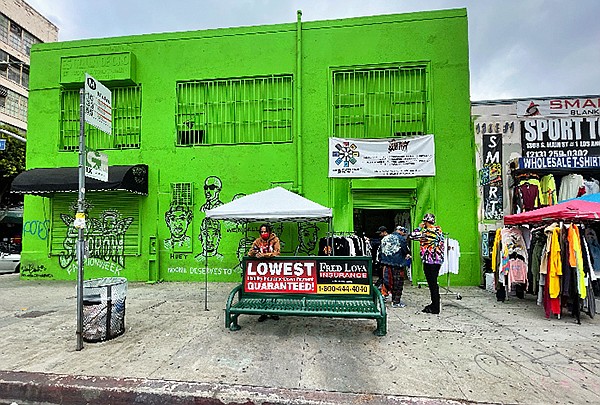Skid Row Fashion Week products are made in downtown L.A. by homeless people who are employed by the brand. | Photo by Skid Row Fashion Week
SKID ROW FASHION WEEK
Skid Row Fashion Week Aims to Change Lives One Design at a Time
In an effort to combat the rampant homelessness in Los Angeles, one brand is trying to help by offering more than just T-shirts.
Skid Row Fashion Week, a play on L.A. Fashion Week, is a streetwear brand that pushes the state of the art and aims to bring awareness to the homeless and the issues surrounding them. The brand was founded by David Sabastian, a Los Angeles–based musician and artist, and Rich Marshall, a skate- and streetwear-industry veteran who launched the East Coast streetwear brand MISKEEN and worked with skateboarder Stevie Williams to develop DGK and Asphalt Yacht Club.
The pair initially met at the Agenda trade show nearly a decade ago and formed an instant bond over their love of fashion and subculture. They launched Skid Row Fashion Week in 2019 and began selling at the Melrose Trading Post flea market.
The brand’s T-shirts provide thought-provoking graphic messages that aim to spark conversation. The shirts are made with 100 percent cotton and are made in downtown L.A. by the homeless living on Skid Row, who are employed by the brand. Sebastian and Marshall understand that the last thing the world needs is another T-shirt, so the brand was created with a conscious effort to have an impact on the community and looked to companies such as Patagonia, TOMS Shoes and Homeboy Industries for inspiration.
After starting with Thanksgiving and Christmas events on Skid Row, the brand believed it could do more than one-time events a few times a year and aimed to provide a lasting impact.
Homelessness continues to rise in L.A. County with the 2020 annual count showing over 66,000 people living on the streets, in shelters or in vehicles, a 12.7 percent rise over 2019. L.A. County called off the 2021 count, citing concerns about COVID-19. The brand says it’s important to reinvest in the community and set future generations up for success.
“We believe it’s mandatory.” Marshall said. “This generation has more of a responsibility to set up our next generation. Based on the Millennial shift that occurred within the last 10 years with online shopping and your local neighborhood stores disappearing, it’s up to local entrepreneurs to reinvest in their communities by way of after-school programs, arts programs, transformational learning and job-creation centers that not only provide income but inspiration.”
Skid Row Manufacturing prints and manufactures all of the brand’s products while providing jobs and job training for the homeless. Skid Row Fashion Week has worked with downtown L.A. Neighborhood Council board member Wendell Blassingame, who has been recognized for his efforts to helping the less fortunate on Skid Row, recruiting some 28 workers. Marshall said there are plans to continue to build on its production processes to help make a stronger impact on homelessness in L.A.
“We are building a vertical distribution and manufacturing enterprise center in DTLA. We’re creating a platform where the homeless and individuals who are from our community can reenter society through our Skid Row Manufacturing hub and learn silk screening, quality control, inventory management, customer service and, most importantly, wraparound services that will offer transformational learning,” Marshall said. “We’re partnering with Los Angeles homeless programs to help as many people as possible.”
Skid Row Fashion Week has hosted pop-up events that benefit L.A.’s homeless population by providing free showers, haircuts, food and a clothing drive. A percentage of the net sales go into programs developed by Skid Row, future charitable events, distribution of toiletries and the implementation of various health-focused initiatives.
The brand also provides home goods and other items to those who have recently transitioned from homelessness to permanent housing, including comforters and other essentials that allow them to feel like residents in their spaces. The brand is excited for what the future holds as it continues to grow.
“Imagine what this brand will do when half the size of Supreme or Bape,” Marshall said. “Today we’re sold in Dover Street Market, and those sales help bring showers, socks, underwear and hope to the hopeless. People should know the more clothing we sell allows us to help more people. We’re changing lives one design at a time.”






















